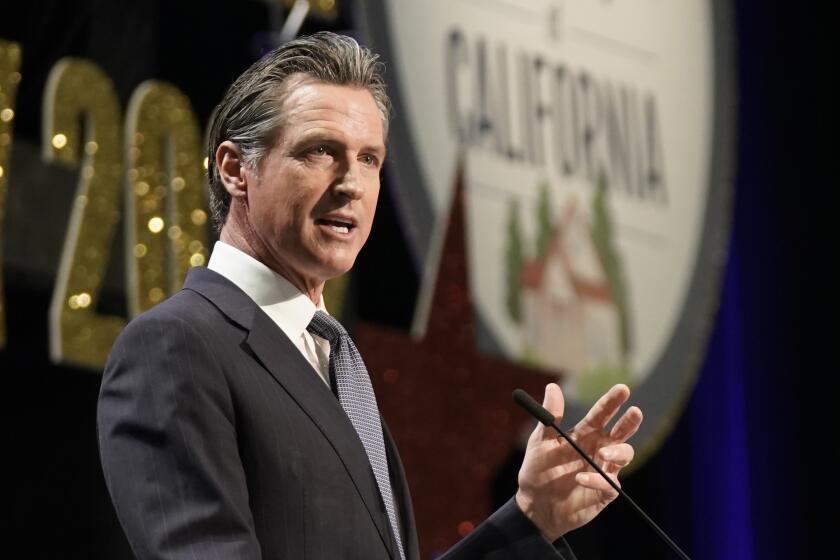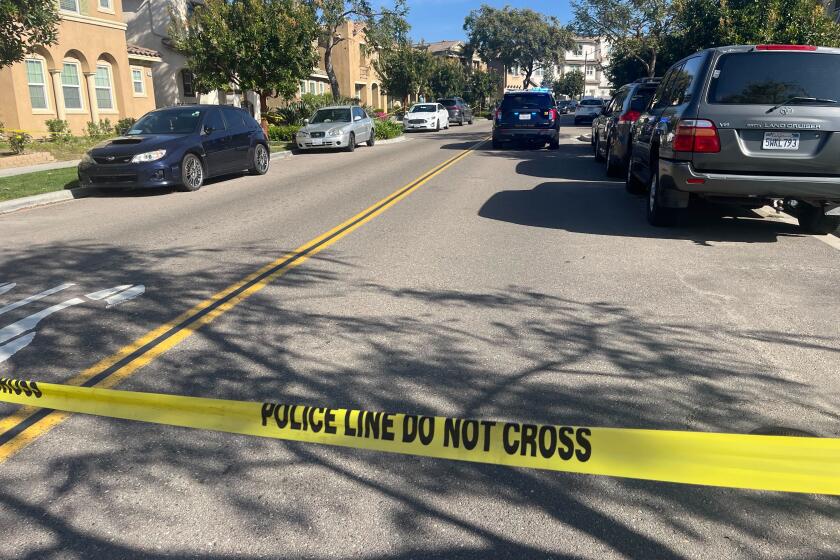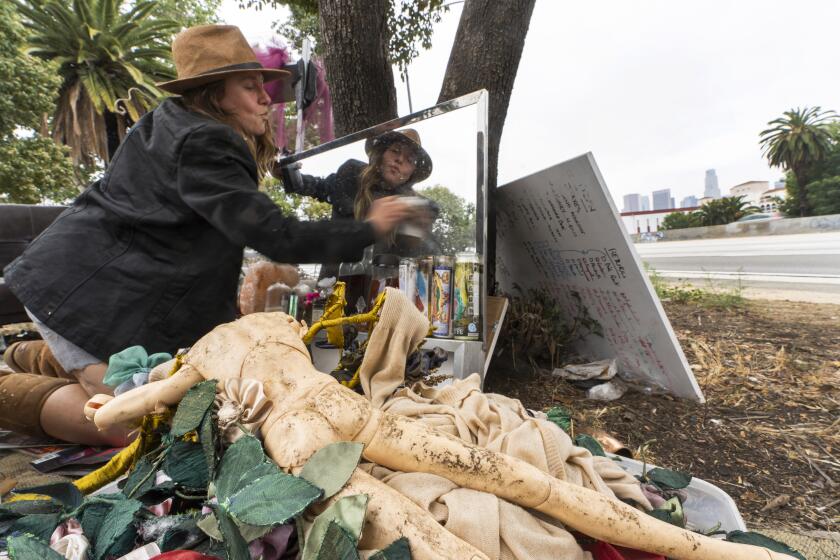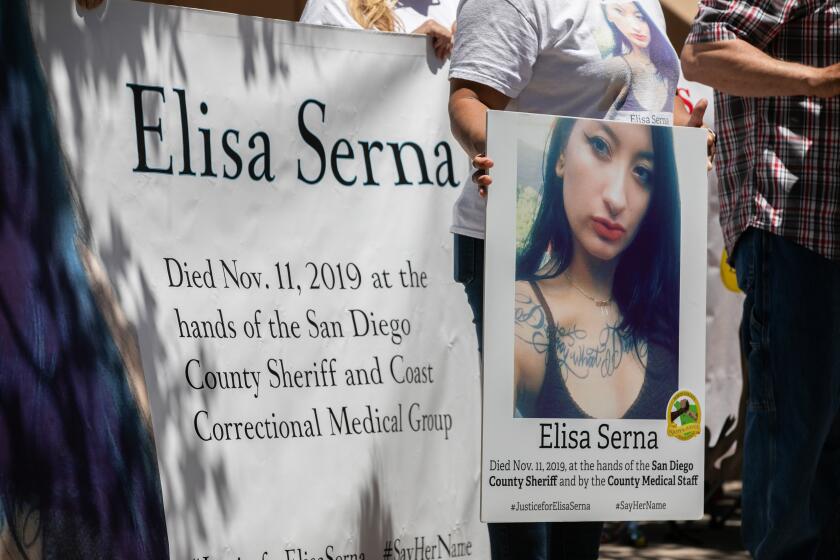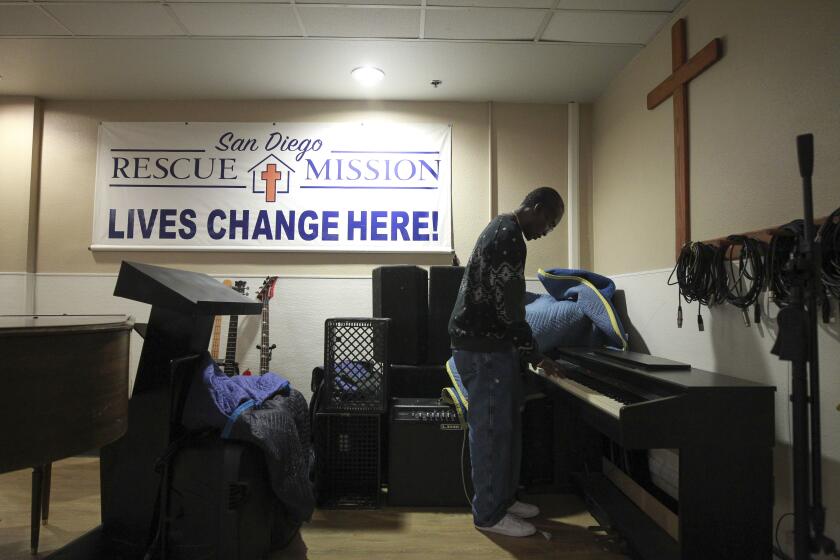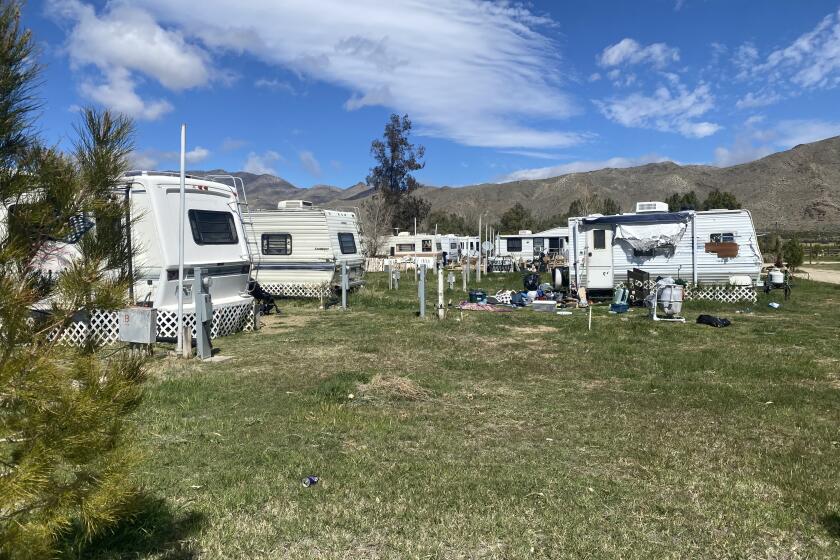U-T Q&A: The San Diego city attorney candidates
The San Diego Union-Tribune editorial board interviewed city attorney candidates Robert Hickey, Rafael Castellanos, Gil Cabrera, Mara Elliott and Bryan Pease on May 17. For their specific comments on current City Attorney Jan Goldsmith’s accomplishments and mistakes, please go here. This is an edited transcript of the candidates’ remarks on other issues.
Q: Tell us why you want to be city attorney.
PEASE: I’ve run a public interest law practice in San Diego for over 10 years. I focused on government transparency, accountability, freedom of speech and assembly, environmental and consumer protection. These are all areas that the City Attorney’s Office office deals with on a daily basis. And I’m the only candidate who has won cases against the City Attorney’s Office on both the civil and the criminal side. The City Attorney’s Office deals with all civil cases for the city of San Diego. And then handles misdemeanor prosecutions for the city. And I’ve won cases that affect important constitutional rights in both of those realms.
I see people who are homeless and on the streets being cited and given fines and ending up getting wrapped up in the criminal system rather than the community actually doing something about this problem. I see a lot of developer influence in San Diego. And developers making huge profits but not building enough affordable and low-income housing and getting out of their legal and moral obligation to do that. So as city attorney, I will lean heavily on developers to make sure that they’re fulfilling their obligations. And that we’re doing everything we can to eliminate this homelessness crisis in San Diego. Environmental and consumer protection are issues that I would also want the city attorney’s office to focus heavily on. Going after white-collar, corporate crime, not just prosecuting people who are poor for things like not having a trolley ticket or something like that. People get caught up in the system. We need to bring back neighborhood community courts. Focus on restorative justice. And then go after some of the big corporate wrongdoers and have a city attorney who is accountable to the public interests, accountable to the people. That’s the kind of city attorney that I will be.
CASTELLANOS: I’m a business and real estate attorney. I’ve been involved in a number of civic and community organizations for a decade, since I arrived in San Diego. In those roles I have always brought my business experience. My legal experience to bear to try to make those organizations run more successfully. And that is the experience in the work that I took to the Port Commission when I joined the Port Commission three years ago. I was nominated and appointed because of my legal and business expertise. With respect to this particular job, I think it’s the highest and best use of my experience, of my skill set and my devotion to the community. I’m a true general counsel so I’m not a courtroom litigator. I make my living advising organizations. And I think that that’s the approach that the city needs.
We have had litigators and bureaucrats in that office for 47 years. And we’ve gotten a series of bad outcomes in the city. The pension fiasco, the bad convention center financing plan that was ruled illegal. The Chargers’ ticket guarantee. These were all really bad deals that have cost the city hundreds of millions of dollars. And it’s because we’ve had hand-picked establishment city attorneys that have rubber-stamp decisions. And have failed to have the right subject expertise. When it comes to the nuts and bolts of the city, what the city does (is) land use, real estate development, project finance, environmental review. Those are the matters where the city has gotten burned for many, many years. And so I want to bring that expertise. It’s an approach that is not based in litigation; it’s about being a true general counsel. It’s about good risk management. It’s about making good recommendations that avoid disputes, help the city plan effectively. And save the taxpayers dollars, protect the treasury. And make sure that we don’t make the same missteps that we’ve made for many, many years.
CABRERA: I’ve been an attorney in San Diego for 20 years. This is where I started my practice. I started at one of the largest and oldest firms in the city. One of the most well thought of in terms of its capability. So I think I got some of the best training frankly, that a lawyer could get. I was recruited to one of the largest national law firms in the country where I worked on some of the highest stakes litigation around. Billions of dollars at issue, cases that went up to the California and the U.S. Supreme Court. And so I bring sort of the level of training that’s a little bit different. My parents immigrated here in the ’60s and really lived the American dream. My whole life they basically always reminded me how remarkable our country was. How we were able to start over and I was able to be the first of my family to finish college. And to always give back. And so from the moment I arrived I tried to give back starting with the Make A Wish Foundation, and the San Diego Master Coral. I was on the Make A Wish Foundation’s board of directors. And then on the National Board of Directors. I served on the Use of Force Task Force that reviewed the police department’s use of force procedures after a string of officer involved shootings in the ‘90s. I then served on the Ethics Commission. And I chaired the Ethics Commission for two years and the critical role there is obviously being able to speak truth to power. Which I think translates very perfectly into this position.
Most recently I’ve served on the convention center board of directors. And I currently chair the Budget Committee, which we’ve worked very hard to make sure the building is maintained and we’re reinvesting in the structure. So the reason I’m running is because I like many San Diegans have seen how important it is to have good, legal counsel given to the mayor and the city council. We constantly get into trouble. We’re almost successful despite ourselves in our town. And if I can bring excellent legal services to the city, to the mayor, to the council, I think we can advance the city in a way that we haven’t before.
ELLIOTT: I work in the office right now as a chief deputy city attorney. I’ve been practicing law for over 20 years. What I do as an attorney has always been public service. I worked for schools for transit and for the county. There’s almost nothing in the office that I haven’t worked on at one moment of time. I have litigation experience as well as advisory experience. At the City Attorney’s Office, I’m the lead attorney for the Audit Committee as well as the Environment Committee. This is such a powerful and important position. It really takes somebody who has the experience and the qualifications to deliver the services to San Diego that we expect. What I want to focus on again is restoring our Neighborhood Prosecutor Program. And having deputies working within communities and building trust. The other thing I want to focus on is making sure that we are cracking down on providers to the city of San Diego. And ensuring that when we hire for instance a contractor, that we’re getting what we expect and going after contractors that don’t deliver. And bringing back as much money as we can into the city. Because the more we bring in, the better we can offer on services. And then finally, one of the biggest things that’s driving me to run, is the potential to deliver services to ordinary people. I want to restore that confidence in our office and protect consumers within San Diego. Crack down on domestic violence, elder abuse, child abuse. We’ve got that power in our office to do that. And I’m looking forward to delivering.
HICKEY: We’ve come out from some pretty big setbacks over the past 16 years with citywide elected leaders not doing their jobs or not doing them right. And it’s going to be really important, I believe the next city attorney will have a lot to say about whether we take full advantage of this opportunity. The opportunities our city faces or if we swing and miss. It’s going to be really important for the next city attorney to have the right vision for the office. I got into public service because it’s in my blood. I’m a son of a Miramar Navy fighter pilot. We moved a lot but San Diego was home. I went into public service as a prosecutor, a deputy DA here in San Diego. I’ve been doing that for much of the last 20 years. I was drawn to gang prosecution. The gang problem in the late ’80s and early ’90s was tremendous. I saw what a disproportionate impact gang crime had on certain neighborhoods. Our office had a philosophy of going after gang crime. I was the assistant chief for the gang unit. I’ve been the Prosecutor of the Year for a gang prosecution of the killer of two innocent women who were shot and killed coming home from a midnight church service. As assistant chief of the gang unit I led 30 attorneys close to 30 attorneys in numerous murder and other investigations. I really wanted to make sure we work hard in the Southeast San Diego community and protect that community. All of our communities deserve the same attention and the same protection. I was assistant chief of our narcotics unit and I was also the president of the Deputy District Attorneys Association, 300 lawyers. It’s no secret lawyers are difficult to lead. Lawyers are all leaders themselves they all have a lot of opinions. So it’s a unique challenge. And the city attorney of course faces that challenge with 150 lawyers to lead. I also was in private practice at a major national law firm now part of the largest law firm in the world where I led a massive litigation of a $330 million Ponzi scheme case. I also worked on land-use issues where I ended up reading every lawsuit filed against Qualcomm expansion, a convention center expansion part one, and then Petco. So I got a real taste for what the city attorney does.
Q: Jan Goldsmith says Cory Briggs’ Citizens’ Plan has legal problems and significant risk to taxpayers. Do you find anything illegal or troubling about it?
CABRERA: I don’t think it’s appropriate for or me or anybody that’s running for city attorney to take a legal position at this point, simply because we’re going to be the lawyers that are dealing with this. And I don’t want to both prejudice the city or preplan what the city is going to be doing in regards to that litigation. What I have said publicly is that I’ve always found it ironic that Cory is the guy that usually sues the city for going down a path that is uncertain, that doesn’t have a lot of precedence for being novel. And this is exactly what he did with this, his initiative, right? The funding mechanism of it, the way it determines that it’s 50 percent threshold and then the size of it. Those are all somewhat novel and they do not go down what he used to call the well-lit path of precedent. And so I have said publicly, I’ve told him privately that I think he’s doing exactly what he tells the city never to do. And I think that raises a lot of issues. And this thing is going to be litigated regardless of the outcome. So I think that’s one of those issues that as the next city attorney I would want to make sure I have the options on how to deal with that.
ELLIOTT: Our office, the City Attorney’s Office has issued a public memo and I think it raises a lot of issues that had to be raised at this time. Because there is a provision in there called a poison pill. And the concern of course from our office is if we’re collecting these increased transit occupancy taxes, and we’re not supposed to, then we could be on the hook for that. So that’s of great concern to me. And we will see what the voters want to do with this. But we’ll be, we’ll stand ready to defend it or deal with the next issue that comes along. But that would be, I’m very comfortable saying that I’m confident in the opinion that came out of our office.
HICKEY: I don’t think the city attorney should take a personal, political position on an initiative like the Briggs’ initiative. But I do think it was appropriate to put out a memo. This is a decision for the policymakers who in this case will be the voters. The voters will decide. And they need to know the risks involving this, involving this initiative. So I think it was the right thing to put out the memo. I think the memo raises some excellent legal issues. A poison pill is a fairly unique thing to see in an initiative. I don’t know that we’ve ever seen one. And then the first thing that jumps off the page is the single subject question. This is very far reaching; we’re talking about downtown, Mission Valley, tourism district overlays, sports entertainment overlays. It’s a complicated; it’s a complicated document. And it deals with a lot of things. But I do think it’s right that the city attorney put out this memo, made it public.
PEASE: I think that the memo from Jan Goldsmith’s office is more politically motivated than legally motivated. I don’t see the same legal problems with the proposed ballot initiative. The so-called poison pill, I don’t think would create a problem because the taxes that would be collected, hotel taxes that would be collected up front, if something gets undone down the road, those taxes would not have been illegally collected. The taxes, the tax increase would have been voted on properly by the voters. And those taxes would have been collected. They would just go back into the general fund. And the tax increase would then go back down. It wouldn’t retroactively make the tax increase illegal. So I don’t see that as a problem. But at the same time, I really don’t like Cory Briggs’ approach. And the fact that when he was challenged by this legal memo he just said well, we’re not going to respond to this we’re just going file you know, we’re going to respond in litigation. He wants to litigate this. I don’t think the voters should tolerate that. This sort of ballot box development decision being made. These complex development decisions being made by a litigator who wants to you know, make more fees suing the city. So I don’t see legal problems with it. But I think the voters should vote it down. I was leaning toward supporting it. But I really don’t like Cory Briggs’ response to the memo and refusing to explain why he thinks it’s legal. And instead saying, well, sue me and then I’ll tell you. That’s just not an appropriate way to handle this sort of thing. And so I’m encouraging the voters to vote it down.
Q: Does the current Charger stadium plan require a two-thirds vote or a simple majority vote in your opinion? And either way where do you stand on that?
ELLIOTT: I suspect and I think like most attorneys up and down the state of California that it requires a two-thirds vote. I would be very uncomfortable if I were the attorney for the Chargers just going for a 50 percent vote plus one. And personally as is the case with the Briggs’ initiative, with the Chargers I will be voting against it. I work in the City Attorney’s Office right now as you know, and we have some critical funding issues. I’d rather see the money go toward something that benefits the public. Public safety, roads, our infrastructure is crumbling. We’ve got water issues in the City of San Diego. So in my opinion, there are more critical concerns for San Diegans than there is building a private Chargers stadium.
HICKEY: I believe you’re referring to the case in Riverside County where it was held (that) a voter initiative would only require 50 plus one vote to make a tax increase. That case is described a lot as an outlier. It’s not citable now because it’s going to be appealed or up on appeal. It will need to be solved. The best I can tell by reading and looking into it and hearing from experts is that it’s going to end up being a two-thirds required vote.
Q: And where do you stand on the plan itself?
HICKEY: My position there is just like the Briggs’ position. The city attorney one of the five people at this table could end up having to defend it, should it pass and taking a personal position on it, is I think inappropriate because we might have to defend it and rather than have our personal opinion out there. It’s better to defend it as the legal counsel to the policymakers. Our job is going to be to provide prompt, accurate, legal advice to the policymakers. And in this situation it could be the voters through an initiative. And if my job is to defend it, I’ll do that. But for me to have a personal position on it I don’t think serves the purpose of the role of the city attorney as chief legal advisor to the city.
PEASE: The California Constitution requires that if the local government wants to raise taxes it has to be put on the ballot and get a two-thirds vote of the people. And what this court decision that’s been referenced now is saying which is the California Supreme Court is going to rule on is whether if the voters themselves, if a citizen initiative comes forward and it passes is that the same thing as the local government raising taxes? And from the plain reading of the California Constitution, it doesn’t refer to ballot initiatives. It seems to be referring to local city, elected city government. So you know I think it’s a very good chance that it could come back that is only a 50 percent plus one requirement to raise taxes if it’s a citizen’s initiative. Now regarding the particulars of the Chargers’ plan itself, I’m leaning toward supporting it. And the reason for that is that hotel taxes here are a lot lower than they are in other cities. We’re leaving money on the table. And because of that requirement the voters have to vote in order to raise taxes, it’s never going to happen unless it’s something that the voters really want. And maybe a stadium is something that the voters want. And that’s better than just leaving money on the table. I think it could help to revitalize downtown like Petco Park did. And the deal that’s being proposed, this isn’t a private stadium that we’d be buying for the Chargers. The Chargers would be paying about a third of the cost and the city would own the stadium. They’d rent it out. There’d be a 30-year lease to the Chargers. And then it’d be used for all other kinds of events. And it could play a really good role in revitalizing downtown and be good for the city. The point though is it’s up to the voters. The voters should vote on this. This isn’t money, I’m not in favor of ever using general fund money to subsidize you know a private sports team. But we’re talking about money that wouldn’t exist. The hotel taxes wouldn’t go up and the hoteliers would just keep that money. So why not use it for something if the voters want it? And again it’s up to the voters. But I’m leaning toward supporting that.
CASTELLANOS: So I agree as far as the assessment of whether it will be a simple majority or two-thirds vote. It’s a gray area. We can say all day long that we don’t want to take a position. But what the current city attorney should be doing right now and the mayor’s office is they should be vetting this project. Because if it does pass, then we’re going to be stuck with it. So we need to make sure that it’s going to be a good deal. Now with respect to where do tax dollars go? The idea that these tax dollars should go into these other services is the red herring. Because there is no competing initiative that is strictly for fire services and streets and police and parks and rec and library. It doesn’t exist. The only two initiatives that we’re looking at right now, are the Briggs’ initiative and the Chargers’ initiative. So what we need to look at is if this passes can we get a good deal? So there are number of issues. These are real estate and development and land use issues that is my expertise, that we need to be thinking about right now as we do the due diligence on this deal. The design and review process that will drive the cost. There’s a process for it in the initiative. The city needs to be vigilant that it’s well-thought-out. The cost estimate will be critical and the design will drive the cost estimate. Because the cost estimate will drive what the finance and terms will be for a bond issuance.
I’m not prepared to support this plan yet because all of this analysis needs to be done to determine if it in fact could be a good deal. And the assumption that we have to insist upon is that if we had another major economic dislocation like the Great Recession, that even under those circumstances there would be excess TOT that would go into the general fund. That’s a heavy lift. And so until that is demonstrated to the voters’ satisfaction, I am not ready to support it. Now the city should be fully engaged to vet this thoroughly. And provide the voters with as much information as possible. So that they can make an informed decision at the ballot box about the economics of this deal and whether or not it could actually be a good deal. But we shouldn’t just pound our chest about oh you know no way, no way, no way. We should be preparing as always for what if it does get passed? That’s what we should be preparing for and that’s what the city attorney’s approach should be. Always thinking about what if?
CABRERA: So the Court of Appeals decision out of Riverside, you know, it’s fairly logically constructed. But we’re not going to know what the state of the law is until the Supreme Court rules on it. It’s one court of appeal and it’s going to be up on appeal, and they’re going to make this decision. If I were the Chargers, I would be planning on getting a two-thirds vote because you don’t know what you’re going to need. From a global perspective, this is a fundamentally stupid way to do land-use planning with competing initiatives where you have two special, two different interest groups putting together citizens’ initiatives and then making the voters decide where both initiatives frankly have a lot of “vaguery” in terms of how they ultimately get implemented. It’s just a horrible way to do planning as a general proposition. And so I have a problem with that globally. With regard to the initiative itself I don’t think it’s right for me to take a position on it. Because I may be dealing with it. But I am skeptical of taxpayer dollars generally being used to subsidize frankly sports stadiums and things like that. And I’ll tell you why.
If you read the Atlantic piece of about a year ago where they did a review of every deal that the NFL did with all the cities across the country, not a one of them worked out well for the cities. Not a one. You cannot justify as a general proposition these types of things on an economic basis. They rarely work out economically for the city. Now, we’re a big city and we want a football team and we want to pay for it and we want to sacrifice something else and the voters decide that? Great. But the job of the city attorney is going to be to protect the taxpayers. It’s going to be make sure we don’t have something like that Chargers’ ticket guarantee. It’s going to make sure that if the Charger initiative passes that definition of what’s the convention center and what’s the stadium is clear so that we’re not paying for stuff we shouldn’t be paying for. That’s the job of the city attorney is to ultimately to protect the taxpayers when we’re looking at a project. And you can prepare for a lot of that now, but there’s so much “vagueries” in either initiative, that a lot of that is going to be on you know, as it’s being implemented. And that’s going to be the critical role of the city attorney.
Q: We got a handful (of Facebook questions) so I’m going to pick one of them. It is on marijuana dispensaries. What would your approach be to marijuana dispensaries in the city of San Diego?
PEASE: So I’m endorsed by Terry (Best) who is the San Diego Chair of San Diegans for Safe Access. My primary goal in dealing with this issue is making sure that people have access to their medicine. I don’t care what the medical marijuana lobby and industry wants. I don’t care what folks who just have a moral objection to people having access to this medicine, want. I want people to have safe access.
CASTELLANOS: I agree 100 percent that people should have access to it. The policymakers have adopted an ordinance. I will enforce that ordinance to make sure that those are the dispensaries that are operating. Jan Goldsmith indicated that he’s going to start using the criminal side of the office to try to get these illegal dispensaries out of business. And you know if we’re going to fulfill the intent of the ordinance, which was crafted with the help of the Medical Marijuana Trade Association then we need to put out the illegal dispensaries. As city attorney, I would work with the City Council and my office to make sure that only the legal, permitted dispensaries are the ones that are operating.
CABRERA: I’m in favor of making sure that we have reasonable access to medicinal marijuana. I think the issue that we’re having right now is the way the ordinance was crafted, basically allows for 28 dispensaries potentially within the city. And there’s about 14 right now that have been authorized. And the problem that we’re having is there are districts within the city that you can’t have a dispensary because of the way the zoning is structured. District 7 is one of those. It’s very hard to find a place for a dispensary within District 7. I think you need to tweak the ordinance to make sure that you have a fair distribution of dispensaries. That you have enough to frankly deal with demand in a legal manner. My concern is playing a game of whack a mole. With all these illegal dispensaries that pop up all the time, when you don’t have an ordinance that’s quite crafted to deal with the legal dispensaries is a losing proposition. So I would be advising the council to try to as the enforcement officer to make sure that we’re able to keep up with this, I’d be advising them to adjust the ordinance to make sure we do it.
The other thing is right now as a city we have an ordinance on dispensaries, we don’t deal with cultivation, we don’t deal with delivery, we don’t deal with some of these other wrap around services around this industry. And we should have these ordinances in place so we can regulate it. That’s the key is to have a successful and reasonable regulation of this industry because the other thing that we have coming down the pipeline is recreational use. And if we don’t get it right on the medicinal side, it’s going to be a disaster on the recreational side.
ELLIOTT: I do think that there are additional steps we can take to make it easier for the public to understand what the rules are. And Gil hit on delivery. That’s not yet covered. So our office should be proactively advising these are the things that we are seeing. Here’s where you can patch the holes that exist. As for the current ordinance that’s in place, as an issue of fairness as you would for any other business you need to impose the law. And the people who have legal dispensaries and are operating them paid a lot of money to have the privilege of doing that. And we need to defend that right. So those who are operating illegal dispensaries ought to be put out of business immediately. And we should use all tools available to us civil and criminal to ensure that, that occurs.
HICKEY: I see it largely as a code enforcement issue. Have them in the right places. But we do have to get them online as fast as we can. That way we kill the market for the illegal dispensaries. As long as we don’t have enough availability the illegal dispensaries are going to find a market for themselves. So it’s a code enforcement issue. Code enforcement is a really important tool to the City Attorney’s Office to work on the quality of life in neighborhoods. Be it slumlord issues or medical marijuana dispensaries.
Get Weekend Opinion on Sundays and Reader Opinion on Mondays
Editorials, commentary and more delivered Sunday morning, and Reader Reaction on Mondays.
You may occasionally receive promotional content from the San Diego Union-Tribune.


